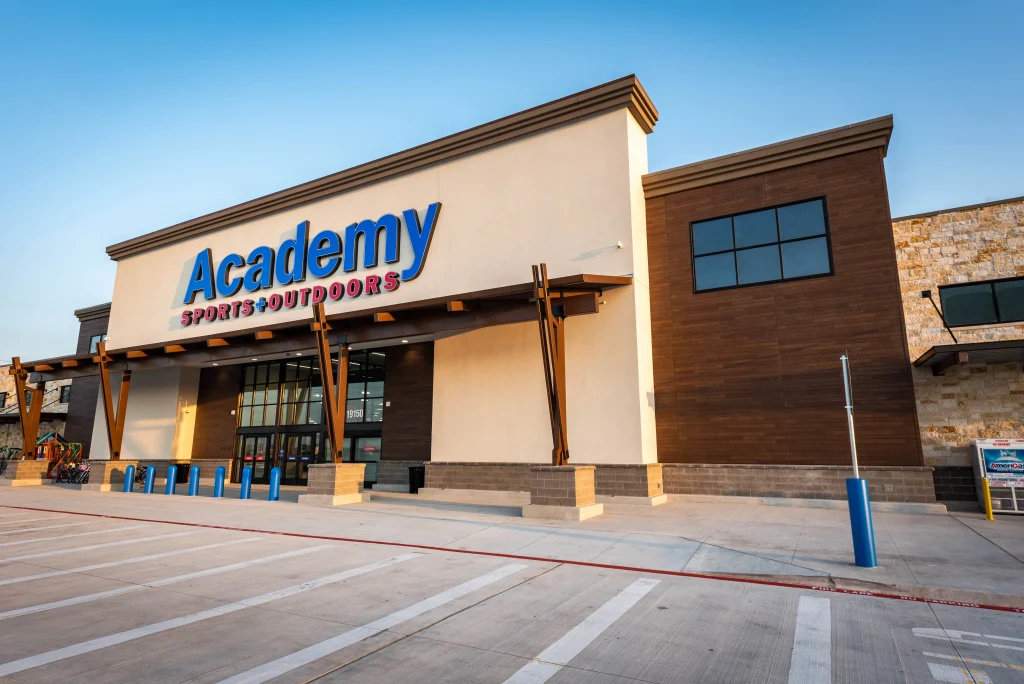At Goldman Sachs’ 30th annual Global Retailing Conference, Academy Sports + Outdoors executives covered a wide range of topics in the Fireside Chat, including the promotional climate, the chain’s expanding “good, better, best” pricing strategy, and many major vendors’ newfound appreciation of wholesale selling.
“Certainly, during the pandemic with the rise in dot.com, I think vendors fell in love with the DTC business in some cases, but I think they’ve realized that they need good wholesale partners as part of the mix,” said CEO Steve Lawrence at the event Tuesday. “So, we’ve seen a reversion to more of that.”
The discussion comes as Nike this year is returning to selling footwear at DSW and apparel at Macy’s while working to repair its relationship with Foot Locker. Nike had exited a number of traditional wholesale accounts in recent years as it focused on DTC selling and narrowed its wholesale focus. Under its new CEO Bjørn Gulden, Adidas is also investing in improving its relationship with wholesale partners.
Lawrence still said Academy “never lost access to a lot of these brands,” largely because Academy serves as the “entry point to sport” for consumers due in large part to its strong value proposition. He said “active young families” are Academy’s core customer.
Lawrence said, “When you talk to a Nike, Under Armour or Adidas, one of the reasons they really value us is because we’re that place where that kid finds his first glove or first soccer ball. And that entry point is important in the belief that if the kid starts out with that brand, he’s going to take it through his life. It’s a very powerful thing for these brands. And so that’s what we really represent to a lot of these companies and that’s why they really value our partnership.”
He also believes that major sports vendors value Academy’s wide offering of products that enable them to reach different customers than those visiting a store only specializing in footwear or the outdoors. Lawrence said, “We can sell them the basketball, the glove, the cleats, right? They can find the apparel. They can find everything in our store and a lot of places don’t do that. So that’s really been helpful.”
He added that Academy’s extensive reach across categories helps Academy attract “emerging brands,” with Academy securing a strong position with the Oofos recovery shoe as well as with Burlebo, a regional men’s wear brand based in Austin. The eclectic mix also enables Academy to explore “new ideas,” such as Bogg Bags. Lawrence said, “I think the position we have in the market is very attractive to vendors and we’re getting more and more vendors coming to us with new ideas.”
Asked about managing promotions, Lawrence said promotions have become a more important tool in the current environment because they’re resonating with the strained consumer. Said Lawrence, “Value is kind of what they’re responding to so promotions can be a value.”
He said about 75 percent of Academy’s sales come from its everyday-value proposition at regular price. Academy prices some national brands about $5 off MSRP (manufacturers suggested selling price) to “provide a great value every day on national brands.” Private label products make up about 20 percent of the mix and feature “really sharp” pricing. Academy tends to promote during the “big market share time periods,” such as Mother’s Day, Father’s Day, back-to-school and the holiday. He said, “That’s really where we target a lot of our promotions.”
Lawrence said promotional levels in the marketplace had been minimal during the early stages of the pandemic but started to increase in the latter part of 2022 as supply chain bottlenecks eased and the macroeconomic conditions began to weaken. While “still not back to 2019 or prior levels,” promotions have continued this year and are expected to continue in the back half. Planned promotions are included in Academy’s guidance.
“We feel like we’ve got a pretty good grip on it but you’ll see us be promotional and offer value that way during holiday on a lot of those categories that are kind of in-and-out categories,” said Lawrence. “Things like game tables and ride-ons that we sell. Those tend to be the things we’re leaning into with more promotion and then we lean into everyday value on more than everyday assortments we carry year-round.”
“I always talked about three types of promotions,” said Mike Mullican, president, at the conference. “The first type is where you get overbought. You don’t do your job very well and now you’ve got to clear merchandise. We don’t have that problem and we’ve been we’ve been really diligent around that. The second type that you’ve are promotions that you plan for. We’ve got some of those coming in the back half. Those are built into our plan and you buy for them specifically to run them. And the third is where you got to counterpunch, where other people’s problems become your problems. We haven’t seen frankly a lot of that. If we see the environment becoming more promotional, we’ve got the flexibility to match others and do that.”
Other topics covered in the presentation:
- Changes under new leadership: Lawrence said he doesn’t have any major changes as a result of his promotion earlier this year from chief merchant to CEO or Mullican’s promotion from CFO to president. The change came as Ken Hick’s retired as CEO. Lawrence said most members of Academy’s management team have been around for five years and they were all involved in formulating Academy’s long-range plan presented in April at Academy’s Investor Day. The primary focuses of the plan include accelerating store expansion, increasing e-commerce sales to around mid-teens (e-commerce made up 10.7 percent of sales in 2022), and improving store productivity. Lawrence said, “I think you’re going to see us lean into maybe some more finite tactics around how we do some of those things. We’ve learned a lot around new store openings, for instance, in terms of how we tease them out, what time of year works better, the marketing needed for openings, etc. So, more informed strategies and finetuning, but I don’t see any big fundamental change.”
- Big-ticket item pressures: Although many retailers are calling out weaknesses in big-ticket, discretionary purchases in the more-challenged retail climate, Lawrence said the big-ticket performance at Academy varies by categories. Some items with a long-replacement cycle that surged during the pandemic, such as fitness equipment, continue to be “soft,” but sales of kayaks have “started to stabilize” after seeing a pandemic surge followed by a contraction. Outdoor grilling has long ranked among Academy’s top sellers despite its high-ticket price. Lawrence attributes that outdoor grilling’s strength to strong innovation within the category. Lawrence said that in the current environment, Academy sees consumers gravitating toward value, which he said “certainly plays in our sweet spot.” However, sales gains in certain categories and brands are showing newness and continue to hold strong appeal. Lawrence said, “If there’s newness and innovation out there and it’s something that the customer doesn’t have, they’ll spend up for it.” Mullican also attributed some growth Academy is seeing in big-ticket categories to Academy’s investment in service.
- Expanding Price Points: Lawrence said Academy is in the “middle innings” of building out a balanced “good, better, best” assortment of products. He said the efforts started pre-pandemic. He noted that Academy has traditionally been best known for “good,” or opening price-point product. He said, “We didn’t have the ‘better’ ‘best’ end of the assortment to really take a customer on that journey through sport.” Lawrence said the opening price point range, or value component, is “still the big chunk of our business,” but higher price points, such as some baseball gloves over $100 and some at $300, have been added in some categories to enable Academy to address a wider range of customer needs, such as the baseball player advancing to the recreational league, high school play or travel leagues. Some categories such as baseball, fishing and grilling have been realigned to have an appropriate balance across pricing points and quality, but categories such as firearms are still imbalanced. Lawrence said, “We got some categories that we’re still working on that, and we think there’s still opportunity.”
Photo courtesy Academy
















